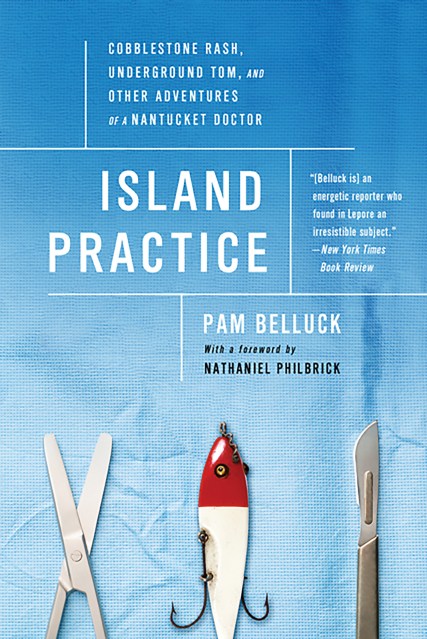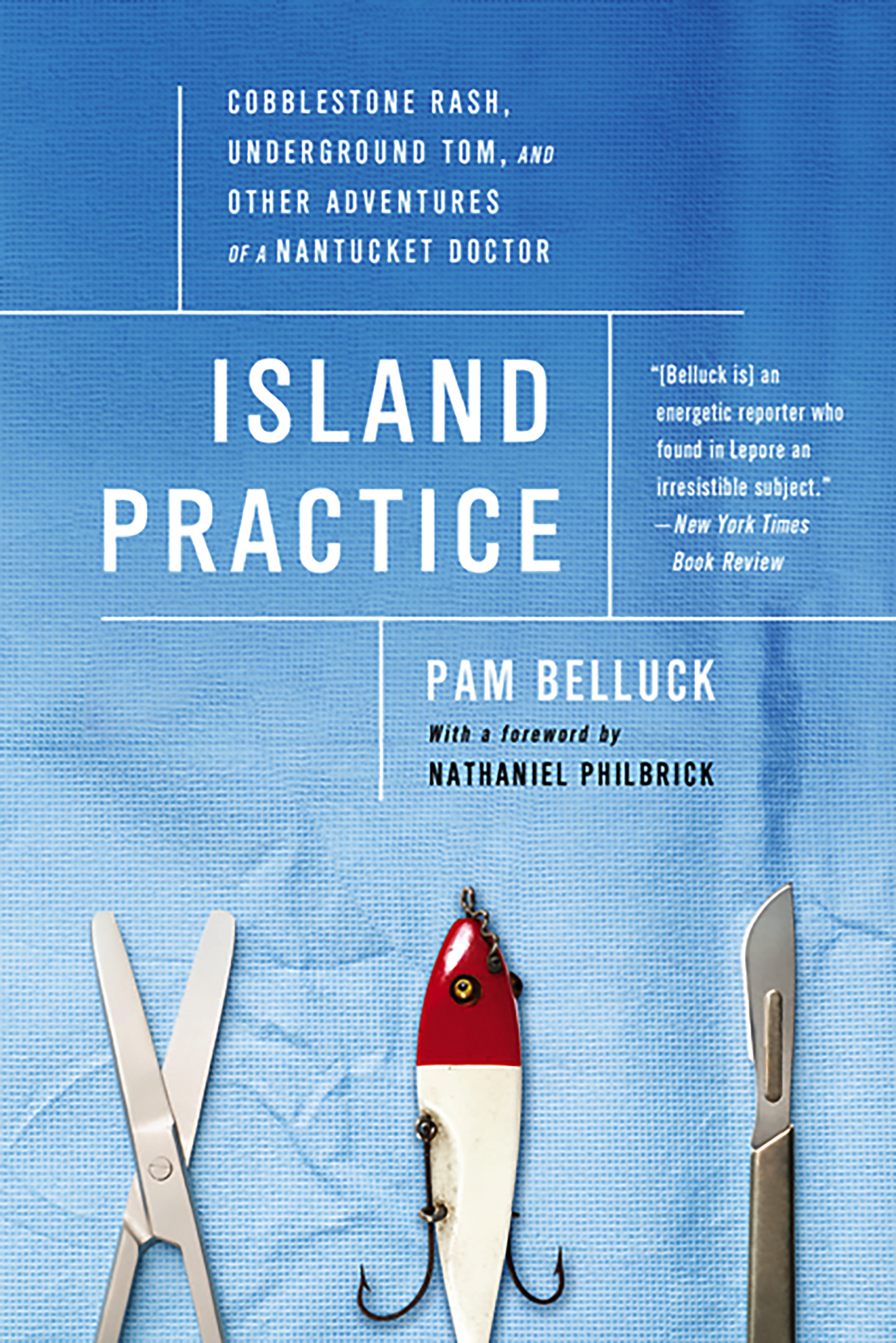By clicking “Accept,” you agree to the use of cookies and similar technologies on your device as set forth in our Cookie Policy and our Privacy Policy. Please note that certain cookies are essential for this website to function properly and do not require user consent to be deployed.
Island Practice
Cobblestone Rash, Underground Tom, and Other Adventures of a Nantucket Doctor
Contributors
By Pam Belluck
Formats and Prices
- On Sale
- Jun 25, 2013
- Page Count
- 304 pages
- Publisher
- PublicAffairs
- ISBN-13
- 9781610392457
Price
$21.99Price
$28.99 CADFormat
Format:
- Trade Paperback $21.99 $28.99 CAD
- ebook $9.99 $12.99 CAD
This item is a preorder. Your payment method will be charged immediately, and the product is expected to ship on or around June 25, 2013. This date is subject to change due to shipping delays beyond our control.
Buy from Other Retailers:
If you need an appendectomy, he can do it with a stone scalpel he carved himself. If you have a condition nobody can diagnose — “creeping eruption” perhaps — he can identify what it is, and treat it. A baby with toe-tourniquet syndrome, a human leg that’s washed ashore, a horse with Lyme disease, a narcoleptic falling face-first in the street, a hermit living underground — hardly anything is off-limits for Dr. Timothy J. Lepore.
This is the spirited, true story of a colorful, contrarian doctor on the world-famous island of Nantucket. Thirty miles out to sea, in a strikingly offbeat place known for wealthy summer people but also home to independent-minded, idiosyncratic year-rounders, Lepore holds the life of the island, often quite literally, in his hands. He’s surgeon, medical examiner, football team doctor, tick expert, unofficial psychologist, accidental homicide detective, occasional veterinarian. When crisis strikes, he’s deeply involved.
He’s treated Jimmy Buffett, Chris Matthews, and various Kennedy relatives, but he makes house calls for anyone and lets people pay him nothing — or anything: oatmeal raisin cookies, a weather-beaten .44 Magnum, a picture of a Nepalese shaman.
Lepore can be controversial and contradictory, espousing conservative views while performing abortions and giving patients marijuana cookies. He has unusual hobbies: he’s a gun fanatic, roadkill collector, and concocter of pastimes like knitting dog-hair sweaters.
Ultimately, Island Practice is about a doctor utterly essential to a community at a time when medicine is increasingly money-driven and impersonal. Can he remain a maverick even as a healthcare chain subsumes his hospital? Every community has — or, some would say, needs — a Doctor Lepore, and his island’s drive to retain individuality in a cookie-cutter world is echoed across the country.
-
“A vibrant, throbbing, and sometimes painful book about life on an island and all the messiness that goes along with helping people through hard times if you're the local doctor. . . . Island Practice is chock full of colorful anecdotes of island life, humor, empathy, color ful and sometimes X-rated medical emergencies, and the mundane that make up the life of a country, or island, doctor.”—Nantucket Inquirer and Mirror
“Funny, startling, and sobering by turns.”—Columbus Dispatch
“This is a riveting portrait of a dynamic, headstrong physician. Medical nonfiction fans will find much to enjoy. Lepore may remind readers of Dr. Paul Farmer from Tracy Kidder's Mountains Beyond Mountains.”—Library Journal
“Thank goodness for writers like Pam Belluck who, in Island Practice, presents Dr. Tim Lepore, a cross between Marcus Welby and Hawkeye Pierce of M*A*S*H fame. . . . Island Practice is a work of evocative imagery and human description. It is readable, captivating, and almost cautionary in its description of what we have lost in today's world of medicine. Author Pam Belluck has integrated medical, personal, and family issues into a fascinating portrait of a remarkable man.”—New York Journal of Books
-
“Through the improbable story of an eccentric and intensely creative Nantucket doctor—the man has operated with flints!—Pam Belluck has crafted an elegant and wildly entertaining depiction of the struggle to maintain humanity and empathy in the face of health care 's ongoing industrialization. A natural storyteller with a reporter's eye for detail and a stand-up comic's dry wit, Belluck leaves the reader with an urge to feign illness just to have an excuse to visit her subject. A truly wonderful read.”—Warren St. John, author of Rammer Jammer Yellow Hammer and Outcasts United
“If you want to understand the ‘real' Nantucket, you must read Island Practice. Dr. Tim Lepore personifies the island's fierce, quirky, and independent spirit. This is a book about an extraordinary man—a doctor, yes, but also a community hero. His story is as engrossing as the best fiction . . . but it's all true.”—Elin Hilderbrand, author of Silver Girl and other novels
“[An] absorbing debut. . . . An intriguing biography of a unique—and on Nantucket, irreplaceable—doctor.”—Kirkus
“Page-turning prose. . . . Inspiring and entertaining, Lepore 's story and his beloved island come to life in Belluck's hands.”—Publisher's Weekly
-
“[Belluck is] an energetic reporter who found in Lepore an irresistible subject.”—New York Times Book Review
“A fun profile of Nantucket's gun-toting, marijuana-prescribing, house-call-making local doc.”—People magazine
“Throughout, Belluck's prose is beautiful and lyrical . . . the Lepore she gives us is a fascinating character.”—Boston Globe
“Island Practice is a thorough dissection of a man doing his best to stand up to impersonal twenty-first-century medical practices. . . . What's more, the book sketches a complex portrait of Nantucket itself—the stuff you won't see in Frommer's—that makes you glad that at least one guy is ready for anything.”—Minneapolis Star Tribune
“[I]ntriguing cases handled by Lepore are described in the new book Island Practice, written by Pam Belluck, a New York Times health writer.”—msnbc.com
“New York Times writer Pam Belluck . . . clearly knew great material when she found it.”—Nantucket Chronicle
“Island Practice gives readers an inside look at the peculiar challenges of health care on the island while reflecting on those that all communities face.”—Boston Globe's “White Coat Notes”
-
“If you were as entranced as I was with John Berendt's Midnight in the Garden of Good and Evil and Susan Orlean's The Orchid Thief, you'll find similar pleasures in Island Practice.”—Huntington News
“Much in this book by Pam Belluck comes as a revelation. Some of it is fascinating; some of it is hilarious; and some of it is sad and very troubling. In Island Practice, Belluck has created a remarkable portrait of a physician and the island community to which he remains steadfastly devoted.”—from the Foreword by Nathaniel Philbrick, author of In the Heart of the Sea and The Last Stand
“Pam Belluck has dissected the antics and heroism of a Nantucket doctor who doubles as the resident wizard. This physician not only makes house calls (even to tree-houses), but also invites patients to drop in at his house for treatment. If you suffer from Nantucket Fever—or any other ill while on that island—Dr. Tim Lepore is your man.”—Dava Sobel, author of Longitude and Galileo's Daughter
Newsletter Signup
By clicking ‘Sign Up,’ I acknowledge that I have read and agree to Hachette Book Group’s Privacy Policy and Terms of Use






